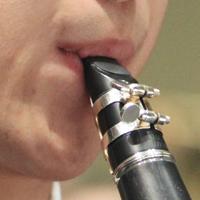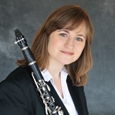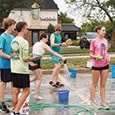When clarinet students start to reach a more advanced level, it can be a struggle for band directors for whom clarinet is not a primary instrument. Below are some ideas on how to best advise advancing students and improve your playing beyond what may have been covered in woodwind methods classes.
Embouchure
 If you do nothing else but make sure all your clarinet players understand and can play with the correct clarinet embouchure, you will be doing them and your band the greatest possible service. Teachers usually say to have a flat chin, but specifically, the lower chin should be pulled down and away from the reed, with only the lip contacting the reed. This creates a concave indent in the chin and should look firm as in the picture below.
If you do nothing else but make sure all your clarinet players understand and can play with the correct clarinet embouchure, you will be doing them and your band the greatest possible service. Teachers usually say to have a flat chin, but specifically, the lower chin should be pulled down and away from the reed, with only the lip contacting the reed. This creates a concave indent in the chin and should look firm as in the picture below.
The earlier in a clarinetist’s career a teacher can implement this em-bouchure the better. Once the embouchure muscles form into habit, it becomes hard to change, and if a student gets to the college level without having learned the correct embou-chure, it will be a difficult road for them. The correct embouchure will make a world of difference in intonation, the ability to play high notes, an ability to play high notes in a pleasing manner, clarity of low notes, articulation, and beauty of tone.
The Break
One crucial moment in a clarinet player’s development is getting over the break. About one third of the way through most beginning band method books, clarinet players learn how to get into the high register using the register key. The break on the instrument, usually known as going from written A4 or Bb4 (easy, free-blowing notes) to B4 (a note with all fingers down and more resistant to play) is a challenge for many students. Crucial to success is the embouchure, which should be flat and unchanging, and increasing the air speed into the resistant note.
If clarinet is not a director’s primary instrument, practicing changing registers occasionally will make it easier to communicate to students. Some-times it is best not to even draw attention to the fact that crossing the break is difficult; just advise them on embouchure and air and they may sail through.
Tonguing
Check tonguing early. Make sure young players are actually using their tongues to articulate. This may seem obvious, but it is surprising the number of strange things students will do if they have never gotten instruction on how to tongue. For some students tonguing may feel weird, and they find novel ways to avoid it.
Some clarinetists may articulate using only air (ha-ha-ha tonguing). Anchor tonguing – locking the tip of the tongue under the bottom teeth and then tonguing with the upper-middle part of the tongue – can hold some students back as well. A generally good piece of advice is the tip-to-tip method, which is using the tip of the tongue to touch the tip of the reed. A good consonant to suggest on clarinet is doo, because that usually produces a clear, but not too aggressive, note beginning.
Equipment
Having a good set-up (mouthpiece, reed, and ligature) is important – even more so than having a good instrument. I highly recommend having the entire clarinet section use the same high-quality mouthpiece. If a student is studying privately, and the teacher suggests other equipment, then by all means support the private instructor. However, this approach is to ensure that those students who are not taking lessons will avoid playing on mouthpieces and ligatures that cause them to struggle. Additionally, a good reed makes a substantial difference in sound. Cheaply made reeds will lead to poor results, so encourage parents to purchase reed brands of known quality.
The idea of making all students play on the same mouthpiece, reed, and ligature is contentious. It is hard to tell parents they need to spend even more money to buy a mouthpiece when one is already in the case or to explain why they should buy a more expensive reed. Some of the many benefits of having everyone on the same equipment, however, include better intonation and a greater uniformity of tone in the section.
Wood vs. Plastic
Advancing players will greatly benefit from having a wood clarinet. There are many fine options in the intermediate-to-professional level of wood instruments to choose from. An unfortunate obstacle to suggesting this to parents is marching band. Wood instruments should not be used for marching, and parents may balk at buying an instrument their child would be unable to use for half the year. Some ways around this problem might be for the school to loan out plastic instruments for marching band or to work with a local music store to rent marching instruments. Advancing students can grow and benefit much more if they are able to get a high-quality wood instrument sooner rather than later.
On a side note, I don’t recommend using bass clarinets in marching band. They generally make little difference in a band’s sound on the field, and more importantly, both plastic and wooden bass clarinets go out of adjustment easily. They should be considered delicate instruments best reserved for indoor concert band.
Literature
Advancing students should practice standard literature, not just the all-state etude of the year. The literature written for clarinet teaches clarinetists how to play. Students benefit tremendously by playing the great composers first hand. As a college professor, one of the most disheartening things I see is the many students who come to audition who have never worked on anything except all-state etudes and their band music. The following is some repertoire I would suggest introducing to high-school clarinetists:
Sonatas Op. 120, No. 1 and No. 2 by Johannes Brahms
Concerto for Clarinet, K. 622 by W.A. Mozart
Fantasy Pieces by Robert Schumann
Sonata for Clarinet and Piano by Camille Saint-Saëns
Concertino, Concertos No. 1 and No. 2, Grand Duo Concertante by Carl Maria von Weber
Five Bagatelles by Gerald Finzi
Six Studies in English Folk Song by Ralph Vaughan Williams
It is possible this music may be too difficult for them, but when they get a start on it, it will challenge them. They will begin to understand how Brahms and Mozart are supposed to sound, and you will have opened a big door for them.






